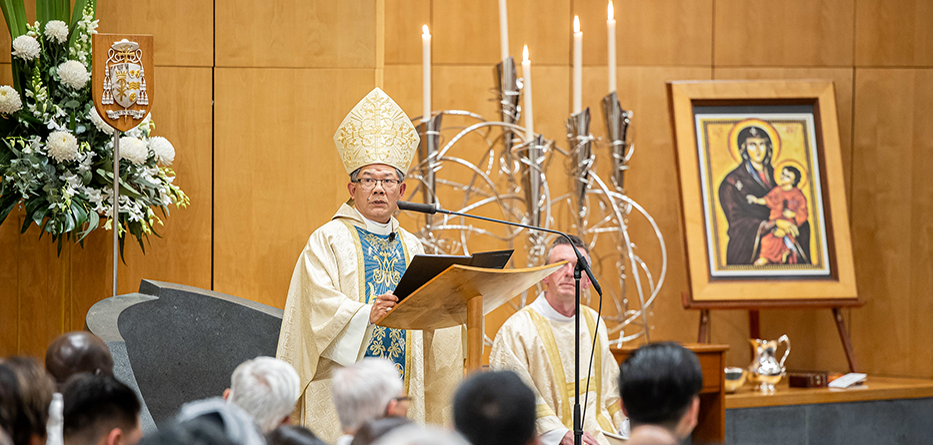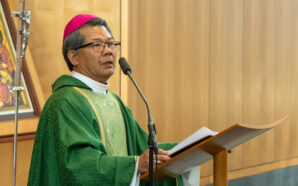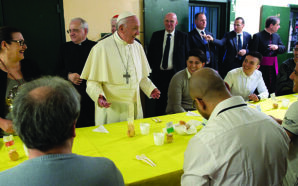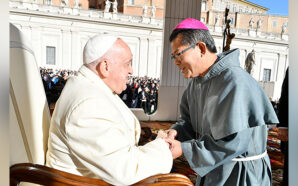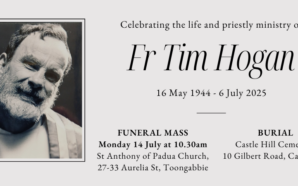Most Reverend Vincent Long Van Nguyen OFM Conv DD STL, Bishop of Parramatta
Homily for Christmas Night
Readings: Isaiah 9:1-7; Titus 2:11-14; Luke 2:1-20
EMBRACING THE SELF-EMPTYING GOD THE EMMANUEL MANIFESTS
Dear brothers and sisters,
“The people that walked in darkness have seen a great light”. Even as a teenager who lived during the long and harrowing civil war in Vietnam, I felt uplifted by the power of these words from the prophet Isaiah. They rekindled our hope for peace. They strengthened our belief that a new dawn awaited those who persevered in goodness despite the darkness of hatred, evil and death.
Tonight, as we come together to celebrate the birth of our Saviour, we are also galvanised by the same belief. Christmas is God coming to us in human form and revealing his divine nature. The Incarnation was not an after-thought of an angry God. It was not plan B, as it were, because we had wrecked plan A. Jesus was and is the fullness of God’s love for us and for all of creation. Through the Emmanuel, born in the lowliest of human conditions, the depth of God’s love is made known. Therefore, no matter who we are: male or female, black or white, straight or gay, rich or poor, high or low, citizen or refugee etc… God’s love embraces us all without exception.
In the Word-made-flesh, God abandoned his own status and embraced total vulnerability. He revealed the love that dares to risk it all for the sake of the beloved. This pattern continued in his life and ministry. Jesus constantly went beyond the borders of every kind and reached out to those at the margins of society. In so doing, he invited us to step beyond our fears, to expand our capacity for love and to break down the barriers of division and exclusion.
In the first reading, Isaiah speaks of the coming of Messiah who would inaugurate a new reign of freedom, justice and restoration for the oppressed. The prophet, however, describes this hero figure not in conventional terms of dominance and power of violence but through images of gentleness, powerlessness and vulnerability. “A child is born for us and a son is given to us” Isaiah proclaims. Thus, it is through the helpless baby that God will establish justice and integrity, dignity and life for his people.
This prophecy in effect spells an end to the imperial ideology, the winners-take-all system and trickle-down model. It finds echoes in Mary’s Magnificat, the Beatitudes and the parables of Jesus where God’s new social order does the very opposite of the pecking order based on wealth, power and privilege: At Bethlehem, God signals his closeness with the lowly and his intent to reverse the world’s pecking order. He summons us to work towards a vision of a new world of communion, harmony and life flourishing for all, starting from the least among us.
Against the background of Isaiah’s messianic prophecy that we come to appreciate the birth of Jesus. “I bring you news of great joy”, the angel said to shepherds, “a joy to be shared by the whole people. Today in the town of David, a saviour has been born to you”. With this announcement, a new dawn had arrived for them, for humanity and indeed for the whole of creation. The birth of Jesus was framed with a backdrop of imperial census that meant heavier tax burdens and economic exploitation. The Holy Family was, like many of the poor today, victim of an unjust social system. Yet with the arrival of the Messiah, the reign of God prevailed over against the rule of greed, selfishness and corruption.
“Glory to God in the highest heaven, and peace to those who enjoy his favour”. We join the angels in praising the gift of the Prince of Peace. It is easy to assume that once Jesus was born, peace is finally established. But the truth is Caesar had already achieved his own version of peace known as the Pax Romana. This security pact was ruthlessly enforced through military might that people in distant corners of the empire like Palestine knew too well. God’s peace is entirely different. It is a new kind of peace to those willing to reimagine the world through the eyes of the lowly, marginalised and vulnerable. It is a peace that comes from right living and right relationships.
Christmas is about the God who reveals himself in the in the peripheries of life. He comes among us not brandishing his power and status. Rather he chooses to immerse himself with our vulnerability by living fully our human condition among the lowliest and weakest members of the society.
As God breaks ranks and becomes vulnerable for us, so must we have the courage to leave our comfort zones and discover the presence, the beauty, the love of God in unfamiliar places, in the margins and the shadows of life. In truth, we cannot worship the Christ child without embracing the self-emptying God he manifested. Our claim of being Christian would be void without imitating his radical solidarity.
Dear brothers and sisters,
The birth of Jesus at the stable means that God is close to the neglected and forgotten. Only by caring for one another, for the afflicted and for all creation, can we harness the energy of love and embody the incarnate God. Indeed, the whole Judeo-Christian enterprise is pivoted to the imitation of the God who identifies himself with the vulnerable. Hence, let us commit ourselves to being signs of hope and agents of healing. Wherever people groan, wherever creation groans, there the community of the Gospel is meant to be with our ministry of solidarity, liberation and empowerment. Let the Emmanuel inspire and galvanise us as we work for the realisation of the kingdom of peace, justice and freedom of God’s suffering people and planet.




